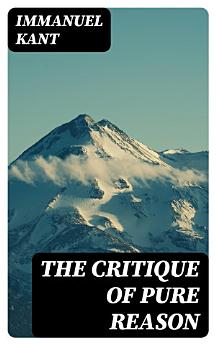eBook 정보
Immanuel Kant's seminal work, "The Critique of Pure Reason," offers a profound exploration of the relationship between knowledge and experience, marking a pivotal moment in Western philosophy. Written in a dense, yet meticulous style, Kant employs a rigorous dialectical method to dissect the limits of human cognition. He introduces his revolutionary ideas around transcendental idealism, arguing that the structure of human understanding shapes our experience of reality, rather than merely reflecting it. This book not only challenges the empiricist and rationalist traditions but also lays the groundwork for modern epistemology and metaphysics, engaging with concepts such as phenomena and noumena in an unprecedented manner. Kant, a pivotal figure of the Enlightenment, was profoundly influenced by the philosophical currents of his time, including rationalism and empiricism. His life in Königsberg, surrounded by the scientific advancements of the 18th century, shaped his inquiry into the possibility of synthetic a priori knowledge and the conditions required for experience. "The Critique of Pure Reason" represents his quest to reconcile faith and reason, reflecting his broader commitment to moral philosophy and human enlightenment. This work is essential for anyone seeking to grasp the foundations of contemporary thought. Readers will find Kant's arguments both challenging and illuminating, prompting a reassessment of their own beliefs about knowledge, morality, and the nature of reality itself. Engaging with this book will deepen the understanding of not just philosophy, but also the contours of modern intellectual discourse.
저자 정보
Immanuel Kant (1724–1804) was a central figure in modern philosophy who synthesized early modern rationalism and empiricism, set the terms for much of nineteenth and twentieth-century philosophy, and continues to exercise a significant influence today in metaphysics, epistemology, ethics, political philosophy, aesthetics, and other fields. Born in Königsberg, which was then part of Prussia (now Kaliningrad, Russia), Kant spent his entire life within the vicinity of his hometown, famously never venturing far from it. He was a precocious student, educated at the Collegium Fredericianum and the University of Königsberg. His most renowned work, 'The Critique of Pure Reason' (1781), revolutionized the approach to philosophical inquiry, particularly in epistemology and metaphysics, by proposing a 'Copernican revolution' in philosophy. This work aimed to analyze the limits and scope of pure reason, establishing the boundaries of science and metaphysics. Kant's unique philosophical approach, often called 'transcendental idealism,' profoundly impacted subsequent philosophical discourse and thinkers. His other notable works include 'The Critique of Practical Reason' which focuses on ethics, and 'The Critique of Judgment,' addressing aesthetics and teleology. His three critiques constitute what is often referred to as his 'critical philosophy.' Kant's rigorous analysis, systematic presentation, and the depth of his ideas have made him one of the most influential philosophers in Western thought. (Guyer, P., & Wood, A. W. (Eds.). (1998). The Cambridge Companion to Kant. Cambridge University Press.)
이 eBook 평가
의견을 알려주세요.
읽기 정보
스마트폰 및 태블릿
노트북 및 컴퓨터
컴퓨터의 웹브라우저를 사용하여 Google Play에서 구매한 오디오북을 들을 수 있습니다.
eReader 및 기타 기기
Kobo eReader 등의 eBook 리더기에서 읽으려면 파일을 다운로드하여 기기로 전송해야 합니다. 지원되는 eBook 리더기로 파일을 전송하려면 고객센터에서 자세한 안내를 따르세요.








